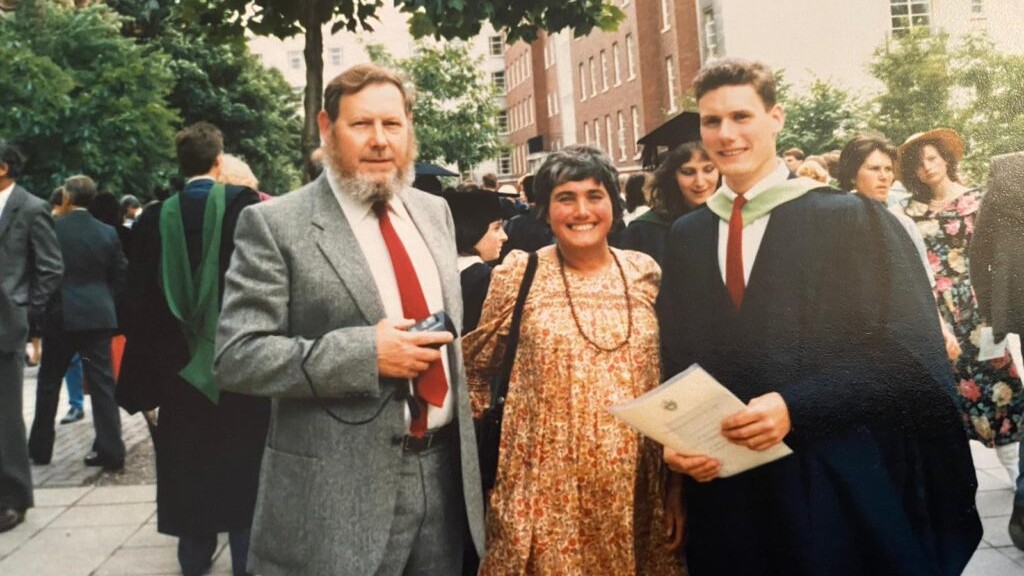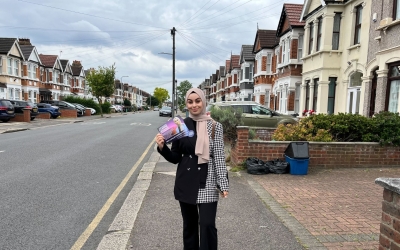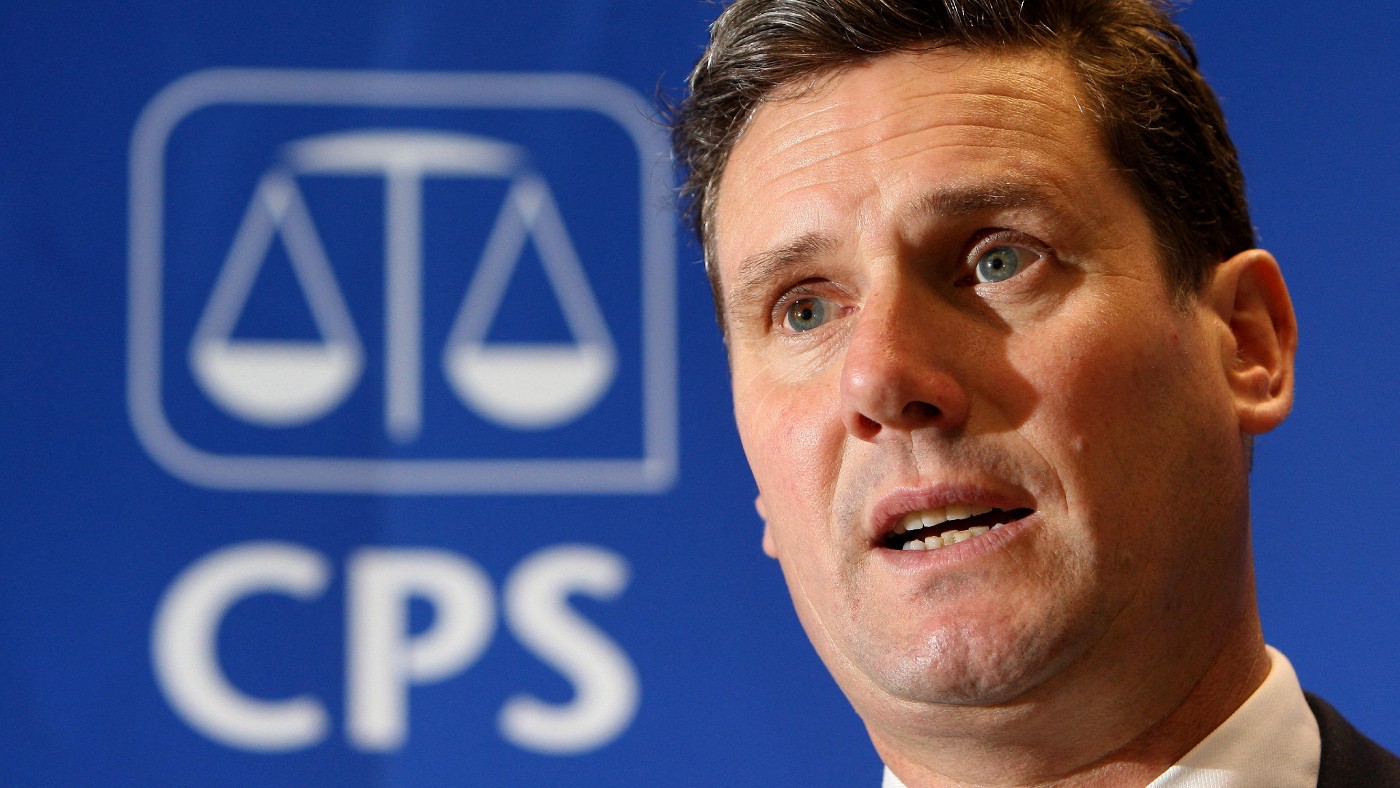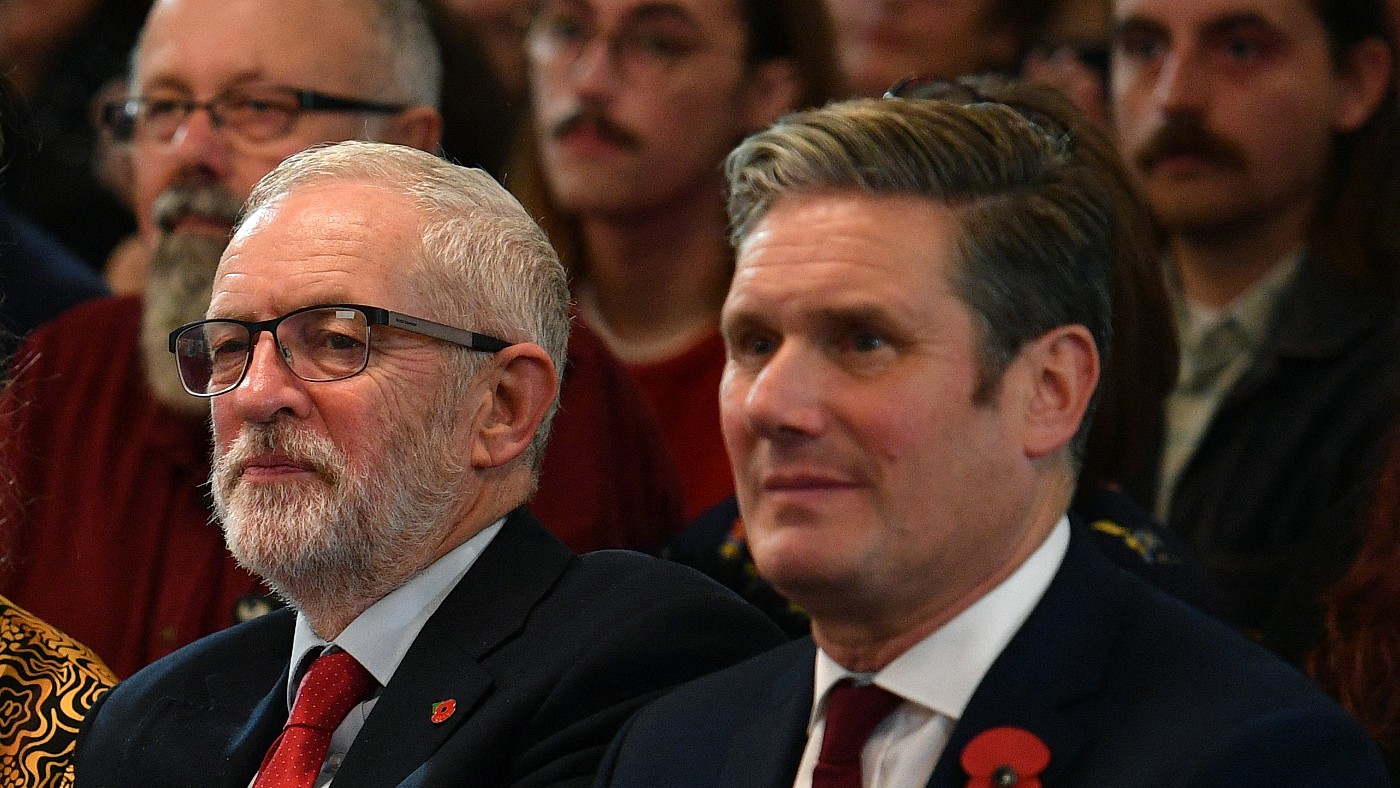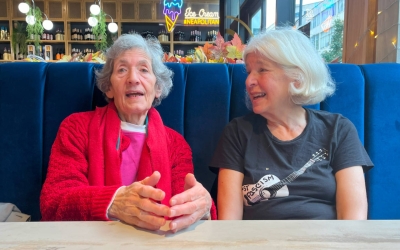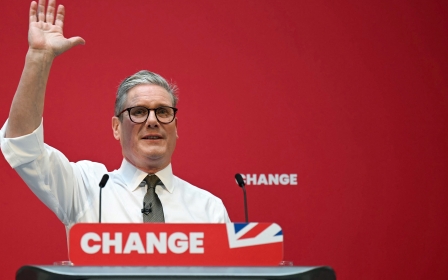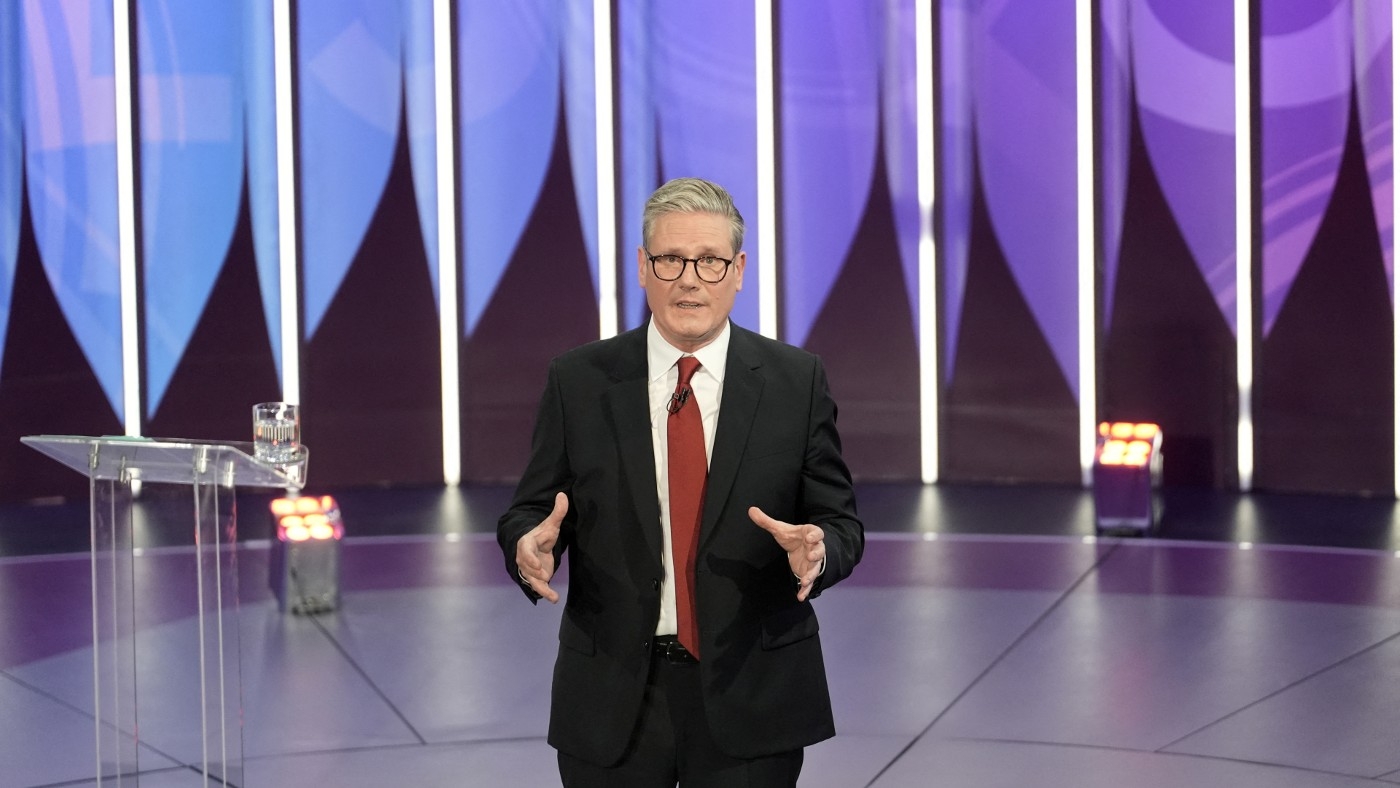
Keir Starmer: The man who would be prime minister
In the summer of 2019, Keir Starmer, then the shadow Brexit secretary in a Labour Party led by Jeremy Corbyn, participated in a Desert Island Discs-style event as part of a fundraiser in Camden Town, north London.
Asked to choose a favourite book, Starmer picked the 1989 novel A Disaffection, by the working-class Scottish socialist author James Kelman.
In November 2020, seven months into his new job as Labour leader, Starmer went on the real Desert Island Discs, on BBC Radio 4. His music choices – Beethoven, northern soul singer Dobie Gray, the Scottish post-punk band Orange Juice, beloved since he was a young man in the 80s – remained much the same.
But instead of a modern novel, Starmer was going to take a “detailed atlas, hopefully with shipping lanes in it”, to the desert island. “Arguably a practical item,” presenter Lauren Laverne noted.
Fast-forward to 2024 and the UK general election campaign. As leader of what he likes to call “a changed Labour Party”, Starmer stands on the verge of claiming the greatest prize British politics has to offer.
New MEE newsletter: Jerusalem Dispatch
Sign up to get the latest insights and analysis on Israel-Palestine, alongside Turkey Unpacked and other MEE newsletters
With the polls pointing to a big Labour win and the job of prime minister close enough to touch, Starmer has retreated further into the realm of the unknown.
Speaking to The Guardian, the lawyer-turned-politician said he did not have a favourite novel or poem. More than that, it turns out that he has “no phobias” and “doesn’t dream” - he simply hits the pillow at 11pm and wakes at five the next morning.
His love of football has remained constant - both in public and private. A diehard Arsenal fan, Starmer has a pint with a loyal, rarely changing group of friends before every home game he attends. He still organises a game near his house in Kentish Town, shouting out the amount of time left at regular intervals and displaying - say those who have played with him - the same competitiveness and relentless will to win he’s always had.
All of which begs an obvious question: who is Keir Starmer? Is he the colleague of Corbyn with a love of challenging, modern Scottish literature, the newly elected leader looking to unify Labour as he digs into a detailed atlas, or the prime minister in waiting, as unmoved by the hatred of the left wing of his party as he is by fictional words on a page?
'The robot'
“He’s not a great reader,” one close friend tells Middle East Eye. “He doesn’t read much for pleasure. Mostly he reads short articles or briefings. He started writing a book outlining his political philosophy but gave up, it wasn’t for him.”
Starmer, the friend says, “is extremely loyal and courteous. He will drop you a handwritten note if you invite him to something. He’s a gentleman, but once he lets his hair down - which is rare - he is quite good fun.
'We would do the work, then all go for a beer. Keir was usually late for the beer because he was doing the work'
- Madeleine Rees, human rights lawyer
“I don’t think he likes wielding the knife,” the friend continues. “But he’s profoundly serious about his project. He wants to remake the country and he wants to do it for working people.”
“He’s become a robot,” says Madeleine Rees, a British human rights lawyer who worked closely with Starmer in the 1990s, likes him and describes him as a decent man. “It’s true of all politicians now. No one has a conversation. They stay on script. It’s all about being rigid and disciplined.”
Rees remembers the young Starmer as an “obviously brilliant lawyer who was obviously going to make it”. He was the hardest-working member of their cohort. “We would do the work, then all go for a beer. Keir was usually late for the beer because he was doing the work,” Rees tells MEE.
Now based in Geneva, Rees says that as a young man Starmer was “a leftie and proudly working class. He does have this service thing. It’s genuine. When you think about how much [money] he was making, he could have stayed in the law and done some human rights cases and had it all. But instead, he does public service.”
That idea of “public service” - which critics on the left have framed as service to the British state - has been a feature of Starmer’s recent debate performances, marking a clear point of difference with former banker Rishi Sunak. As a younger man in the 90s, Starmer was acutely aware that the odds were stacked against working-class people across Britain and wanted to do something about that, Rees says.
By the time he was a Labour politician, this had been smoothed out.
“It was immediately clear that he was very different to Corbyn,” says one Labour peer, who saw Starmer regularly throughout his time as shadow Brexit secretary. “Corbyn was a lifelong campaigner. Starmer was a lifetime doer… He had a mastery of every detail that was unusual even for an experienced lawyer.”
"It was hard to discern what his actual views were. There were incidents that made you realise he was more right-wing or centrist than he let on - or than it seemed when he was first elected," one member of Corbyn's team says.
"He was talked about as a future leader from the moment he became an MP in 2015, but insofar as he had a political profile, he positioned himself well to the left of where he is now, especially when he stood for the leadership in 2020. The level of his deceit and mendacity is really extraordinary."
The boy from Surrey
Born in 1962, Starmer’s childhood - as the son of “toolmaker” father Rodney and mother Josephine, who lived stoically with Still’s disease, a rare type of inflammatory arthritis - is now relatively well known. During election debates, audiences have guffawed when they hear the Labour leader trot out his “toolmaker” line.
But this is where he began, with these parents – one of them living in near-constant pain, the other unable or unwilling to talk openly about it - in Hurst Green, Surrey, a village on the edge of the small town of Oxted in London’s commuter belt.
This was not a romantic place to be: not the multicultural capital city; not one of the storied communities of the north; not Scotland or Wales or Northern Ireland; not the deep west or the coastal shores. Britain has many places with deep, recognisable cultures that can be a source of identity and belonging for a young man from relatively humble origins. Surrey is not one of these places.
Starmer has said that he was not close to his father, a hardworking, reclusive character described by his son at his funeral as a “difficult sod”. In the mid-1970s, when Keir was 13 or 14, Rod Starmer rang from the hospital to tell him that his mother was about to die and that he needed to break the news to his siblings. She survived until 2015, dying just weeks before Starmer was elected to parliament as the Labour MP for London’s Holborn and St Pancras constituency.
“When you’re in a family with someone who has got something really, seriously wrong with them, you don’t feel you can complain, you don’t emote,” barrister Helena Kennedy, a mentor to Starmer, told his biographer Tom Baldwin. “It makes you less expressive.”
For a teenager in such circumstances the law, with its focus on facts and details, on the external - rather than internal - world, seems to have made sense. Starmer went to the University of Leeds and then on to the University of Oxford, picking up law degrees.
The modernising lawyer
Called to the bar (formally recognised as a barrister) in 1987, the young Starmer appeared to be very firmly on the political left. Between 1986 and 1989 he was involved with the Trotskyist magazine Socialist Alternatives. In 1990, Starmer became secretary of the Haldane Society of Socialist Lawyers, which had once been dominated by communists.
Bill Bowring, who as a Labour Party councillor in the 80s had been prosecuted by Margaret Thatcher after deliberately breaking the law to try and bring down her government, was Haldane’s chairman.
“Although I worked closely with him for ten years, he always treated me - a deliberate state criminal, activist on Palestine, active trade unionist and Labour Party member - with at best amused condescension,” Bowring says. “I think he found Haldane really uncomfortable, and he always, I think, saw himself as a reformer and moderniser.”
Like the other former colleagues MEE spoke to for this article, Bowring remembers Starmer as a “very good human rights lawyer” who was diligent and hardworking. In 1996 Starmer led a 45-strong delegation to South Africa, where they met Nelson Mandela.
But just as Starmer’s time as Labour leader has seen the party move sharply to the right, Bowring says that his colleague was looking to use Haldane “as a vehicle” for his own ambitions, changing it in the process from a firmly socialist organisation into one that looked more like Liberty, the more liberal legal human rights group Starmer had earlier worked for.
“He’s a technocrat and he’s very conservative by nature,” Bowring says of Starmer, who, at one particularly stormy meeting, tried unsuccessfully to get Haldane to drop the “socialist” from its name.
At this time, throughout the 90s, Starmer worked pro bono on human rights cases, including instructing Helen Steel and David Morris for ten years in the McLibel case brought by McDonald’s.
The British state servant
His journey to the heart of the British establishment was nevertheless under way, and he served as a human rights adviser to the Northern Ireland Policing Board before being appointed Director of Public Prosecutions (DPP) - the lawyer responsible for the conduct of all criminal prosecutions instituted by the police - in 2008.
As DPP, Starmer developed a close relationship with Eric Holder, the US attorney general, between 2009 and 2015. Holder presided over a government that failed to live up to Barack Obama’s promise to close the detention facility at Guantanamo Bay, that expanded the National Security Agency’s (NSA) mass surveillance programmes and pursued - with the enthusiastic support of Starmer’s Crown Prosecution Service (CPS) - the extradition of WikiLeaks founder Julian Assange.
Starmer also, according to Oliver Eagleton’s The Starmer Project, “worked doggedly to extradite the autistic IT expert Gary McKinnon to the United States”, after McKinnon gained access to US military databases in search of information about UFOs.
Unlike Assange, McKinnon released nothing, but a furious and embarrassed Washington sought - with Starmer’s help - to punish him.
McKinnon, whose autism made him especially reliant on his family, became increasingly depressed and suicidal as successive legal appeals against his extradition to the US - where he was being threatened with a lifetime in prison - failed.
His mother ambushed Starmer in Westminster, where the lawyer said that speaking to her was “making me feel very uncomfortable”. Eventually, then-Home Secretary Theresa May came to McKinnon’s rescue, ruling out his extradition in parliament in October 2012.
In 2010, Starmer decided not to prosecute an MI5 officer known as Witness B, who was accused of participating in the torture of Binyam Mohamed, a British resident arrested and detained by US authorities in Pakistan before being rendered to Morocco in 2002.
Mohamed was held without charge in Guantanamo Bay between 2004 and 2009. While MI5 “knew Mohamed was being tortured”, Starmer said there was “insufficient evidence” to prosecute Witness B.
'We gossip all the time about it. What the fuck is Keir doing? But we are all out there campaigning for him'
- Friend of Keir Starmer
Working mostly under the Conservative-Liberal Democrat coalition government elected in 2010, Starmer impressed his bosses and carried out a thorough reorganisation of the CPS that was in line with the government’s austerity programme, which saw sweeping cuts to public services. He sought tough sentences for participants in the London riots of 2011, turning up at courts in the middle of the night to “boost morale”.
But while Starmer is sometimes blamed for quashing, in 2011, an arrest warrant application issued against former Israeli Foreign Minister Tzipi Livni for war crimes, Bowring, who was involved in the application as part of Lawyers for Palestinian Human Rights, says that the government changed the law in a way that meant Starmer’s hands were tied.
“My impression was that he took the application for an arrest warrant seriously - apparently he sat up all night with it,” Bowring says. “But the government pre-empted him,” with the Foreign Office declaring that Livni enjoyed temporary diplomatic immunity. Another source familiar with the case - and Starmer’s role in it - confirmed Bowring’s version of events.
The Labour man
When Starmer took on the role of DPP, one friend says, “it was clear that he was going to end up running for political office”. And so he did: as Labour’s candidate for the safe seat of Holborn and St Pancras. As part of the campaign, Starmer gave a speech at a pro-Palestine event aimed at getting candidates to back sanctions on Israel.
“Sir Keir did leave about 9pm before the Q&A, after delivering what I recall as a very cautious and hesitant speech, claiming, not entirely consistently, either that he needed to spend more time with his family or that he had another engagement,” recalls then-Green Party leader Natalie Bennett, who sat next to Starmer on the stage.
'I think his stance on Gaza has been appalling. He called it wrong. He blew the chance to be an international statesman'
- Former human rights colleague
“The latter was what he settled on after several repetitions. But I don't think a single person in the room believed it,” Bennett tells MEE. “I think the feeling was that he was frightened of the subject and the room. And his heart was not in it.”
Since becoming Labour leader, Starmer has dropped most of the policies he championed while campaigning to succeed Corbyn. Gone are almost all the "10 pledges" that were at the heart of that campaign, including promises on nationalising public services, restricting foreign arms sales, green investment, tax rises for the richest in society, and more.
The Labour left has been sidelined, with Corbyn expelled from the party, as Starmer has relied more and more on advisers and organisers from the Labour right.
Morgan McSweeney, Labour’s campaign director and Starmer’s chief aide, is the most notable. It was McSweeney, Labour sources say, who drafted the 10 pledges, having analysed what would appeal most to the Labour members electing Corbyn's successor.
The Irishman was previously the director of a group called Labour Together, which was set up in 2015 after Corbyn became leader and which received lavish funding from rich former New Labour donors. Between 2017 and 2020, McSweeney failed to declare £730,000 in donations made by millionaire venture capitalists and businessmen, and in 2021 the Electoral Commission found the group guilty of more than 20 separate breaches of the law.
Labour Together has spent tens of thousands of pounds supplying “assistants” to much of Starmer’s front bench, including shadow Chancellor Rachel Reeves and shadow Foreign Minister David Lammy.
According to one of his former bosses, who spoke to the Sunday Times, McSweeney, whose politics are described as “a combination of patriotism, social conservatism, and traditional left economics”, believes that the “hard left… need to be eradicated from the party because they are so dangerous”.
The issue of Palestine
Part of this has been a crackdown on Palestinian solidarity in Labour, which was a key issue for Corbyn, and an ever-shifting, muddled response to Israel’s war on Gaza. After the Hamas-led attack of 7 October, Starmer told LBC radio that Israel had the “right to defend herself” and the right to withhold power and water from Palestinians.
“I think his stance on Gaza has been appalling,” says one former colleague from the world of human rights law. “He called it wrong. He blew the chance to be an international statesman.”
When it comes to Israel, Corbyn and the issue of antisemitism, the close friend of Starmer’s says it’s important to remember that the Labour leader’s wife, Victoria, comes from a liberal Zionist family that has members in Israel.
“Jeremy [Corbyn] did not navigate this difficult line of being critical of Israel’s leadership and being critical of Israel,” says the friend, implying that Starmer finds references to Israel as an “apartheid state” - a classification endorsed by many leading human rights groups, including Amnesty - or a “settler colonial society” to be at best unhelpful.
Bowring, who does not believe Corbyn handled the issue of antisemitism well, nevertheless refers to Starmer as a “committed Zionist” and points out that Labour has a long history of supporting Israel.
With Starmer as leader, the markedly different positions Corbyn and Starmer take on Israel and antisemitism came to a head after the Equality and Human Rights Commission (EHRC) delivered its investigation into antisemitism in the Labour Party in October 2020.
Before the report was released, according to multiple sources, Corbyn's team had been promised that it was not going to be turned into an "anti-Jeremy" thing, and that they would be able to see Starmer's public response to the investigation before it was released.
On the morning the report was published, Corbyn’s team still hadn’t seen Starmer’s response.
After years in which the media had focused intensely on the issue, the former leader was keen to defend himself. Corbyn put out a statement, in which he said that antisemitism was “absolutely abhorrent” and that “anyone claiming there is no antisemitism in the Labour Party is wrong”. He said that he regretted that it took longer to deal with the issue than it should have.
Corbyn added: “One antisemite is one too many, but the scale of the problem was also dramatically overstated for political reasons by our opponents inside and outside the party, as well as by much of the media. That combination hurt Jewish people and must never be repeated.”
Shortly afterwards, Starmer appeared at a press conference, saying that if there were “still those who think there’s no problem with antisemitism in the Labour Party, that it’s all exaggerated or a factional attack, then frankly you are part of the problem too”.
Corbyn’s team knew they were in trouble, and that they would have amended their statement if they had seen how Starmer was going to respond. Corbyn was duly suspended from the Labour Party and is now, almost four years later, running as an independent candidate.
“Keir doesn’t dislike Jeremy personally,” says the close friend of Starmer. “But Jeremy has not said, ‘I fucked up’, and that’s no fucking good. And it’s symbolically very important for Keir, because he wants to show that the party has changed.”
As he stands on the point of becoming prime minister, many of Starmer’s former colleagues and friends are unsettled by the positions he has adopted to get to where he is. Britain, an old country in decline, battered by 14 years of Conservative neglect, is going to need more than what is in the Labour manifesto to revive it.
“We gossip all the time about it,” says one friend of Starmer’s. “What the fuck is Keir doing? But we are all out there campaigning for him.”
“There is a belief that there is a game plan,” says Rees. “He’s a decent man. He’s not going to embarrass us. He’s not going to lie or cheat, there will be no sleaze. He will hold to his values as much as is possible for a political leader.”
Even Bowring, the committed socialist lawyer, has a Labour placard outside his home. “I cringe slightly when I see the Union Jack on it,” he says.
“Keir was always intensely ambitious. If you had told him in 1990 that he would become Sir Keir Starmer QC, former Director of Public Prosecutions, and Leader of the Labour Party, that would simply have confirmed his ambition.”
Main image: Labour leader Sir Keir Starmer speaks during a BBC Question Time Leaders' Special in York on 20 June 2024 (Stefan Rousseau/Reuters)
Middle East Eye delivers independent and unrivalled coverage and analysis of the Middle East, North Africa and beyond. To learn more about republishing this content and the associated fees, please fill out this form. More about MEE can be found here.


